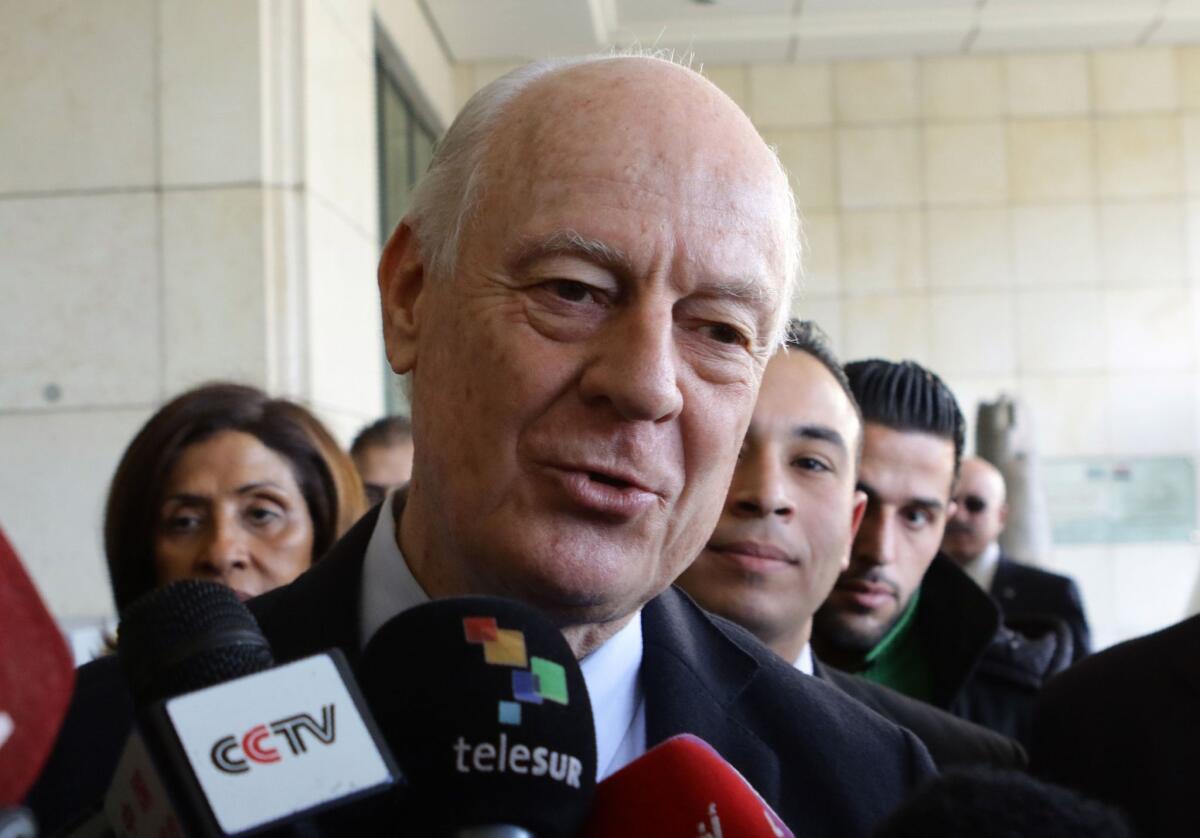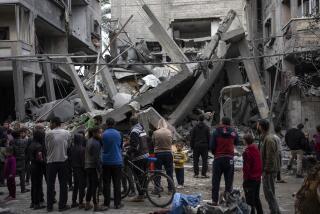U.N. envoy’s peace mission in Syria is undercut by a defiant President Assad

The U.N. envoy to Syria, Staffan de Mistura, speaks to reporters as he heads for meetings in the Syrian capital, Damascus, on Tuesday.
A U.N. envoy met with Syrian government officials Tuesday to discuss how to carry out a U.N.-sponsored cease-fire, even as the country’s leader, President Bashar Assad, dashed already slim hopes of it taking hold at the set time.
Staffan de Mistura, the U.N. special envoy to Syria, briefed Foreign Minister Walid Moallem in Damascus, the capital, the Syrian state news agency, SANA, reported.
It wasn’t clear what, if any, progress De Mistura made in the meeting. With Syrian government forces advancing in recent weeks in the country’s civil war, Assad has less incentive than ever to bow to calls for an end to hostilities.
Last Thursday, the International Syria Support Group, a 17-nation group meeting in Munich, agreed to use its influence with the belligerents in Syria to enforce a “cessation of hostilities” within one week. It also promised the delivery of urgently needed humanitarian assistance to besieged areas in Syria.
Although neither the Syrian government nor its opposition were parties to the agreement, the support group included allies of both sides — notably Russia, which backs Assad, and the United States, which has supplied aid to select elements of the opposition.
De Mistura also spoke with Moallem about the relaunching of peace talks between the Syrian government and the opposition set for later this month.
The negotiations, which were set to begin in January in Geneva, were plagued by problems from the start. They broke down completely after pro-government forces backed by Russian warplanes began an offensive to retake rebel-held areas of Aleppo province.
De Mistura’s visit came one day after Assad delivered a blustery speech in which he all but discounted any cease-fire taking place.
“When does the West talk about a cease-fire? When the militants hurt. When the defeats begin,” said Assad in an address to Syria’s Central Bar Assn. broadcast Monday night by Syrian state news.
He added that a cease-fire could not happen between the state and “terrorists,” whom he defined as “whoever bore arms against the state and the Syrian people.”
“There may be a cessation of operations, a stopping of fighting activities, but it does not enter into a cease-fire,” he said.
Under terms of the Munich agreement, the cease-fire will not apply to groups designated as terrorists — specifically defined as Islamic State, the Al Qaeda offshoot known as the Al Nusra Front and any other group identified as a terrorist organization by the United Nations. Assad considers any group that has taken up arms against his government to be a terrorist organization.
Even if a cease-fire were to occur, Assad said, it would not “mean that every party will stop using its weapons.”
“What it means in the first degree is that the terrorists stop reinforcing their positions. Weapons and ammunition are not allowed to be moved, positions are not allowed to be improved or fortified. All these things are not allowed,” he said.
Assad also questioned whether any such cease-fire could practically be implemented in the given time frame.
“Who can gather all these conditions or requirements within a week? If a terrorist group refuses the cease-fire, who will talk to it, who will hold it accountable?” he asked.
The 44-minute speech also launched a broadside on the timetable set by the International Syria Support Group for a political settlement in Syria, which calls for “credible, inclusive and nonsectarian governance” within six months and “free and fair elections” in 18 months, pursuant to a new constitution.
“Any transitional process, whatever it may be, must submit to the current constitution,” Assad said.
“The use of the current constitution does not stop unless we reach, in some discussion under some framework later, a new constitution that the Syrian people agree on.”
Assad took time in his speech to mock main opposition backers Saudi Arabia and Turkey, describing them as “marginal” countries that are “mere subordinates” to great world powers.
Both nations threatened last week to send ground troops into Syria if the political process to remove Assad fails, and they have begun joint training exercises near the Turkish-Syrian border.
“They [Turkey and Saudi Arabia] are fulfilling the role of trumpets… with the aim of blackmailing us if we go to another round of talks and threatening us with a ground invasion if we do not offer concessions,” Assad said.
Assad’s defiant tone was a reflection of the turnaround by pro-government forces, who in recent weeks have made significant gains against the rebels, denying them access to vital areas near the 500-mile border with Turkey.
The onslaught has also raised fears of the government besieging opposition-held sections of the city of Aleppo, which has been divided into spheres of control between the government and the rebels since 2012. It has also pushed thousands to escape to the border town of Azaz near the Turkish-Syrian border.
The U.N. estimates that 58,000 people remain stranded near Azaz.
The government’s offensive has been bolstered by hundreds of airstrikes by Russian warplanes, which critics have accused of deliberately targeting civilians.
On Monday, reports emerged that more than 45 people had been killed and dozens injured in airstrikes against four hospitals and a school in opposition-controlled areas of Aleppo and Idlib provinces in northern Syria.
“We are gravely concerned about these abhorrent and repeated attacks on medical facilities in the Syrian conflict,” U.N. High Commissioner for Human Rights spokesman Rupert Colville said during a news conference in Geneva on Tuesday.
Colville warned that airstrikes on medical facilities, “depending on the circumstances… may constitute a war crime.”
Russia, however, vehemently denied the charges.
“We are strongly against such claims, the more so since each time those who come up with such charges prove unable to somehow confirm their groundless accusations,” said Russian presidential spokesman Dmitry Peskov, according to a report by Russia’s official TASS news agency.
Bulos is a special correspondent
More to Read
Start your day right
Sign up for Essential California for news, features and recommendations from the L.A. Times and beyond in your inbox six days a week.
You may occasionally receive promotional content from the Los Angeles Times.







